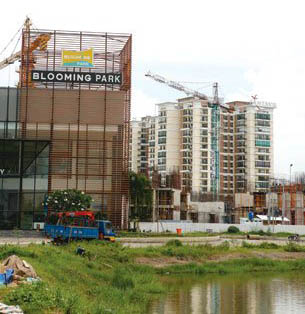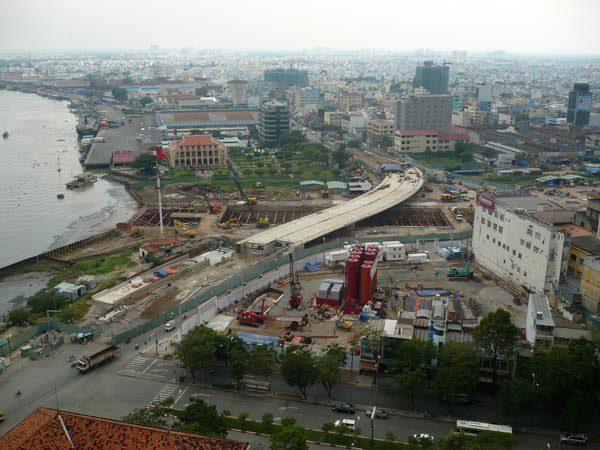Ho Chi Minh City ranks third in the Asia Pacific region in terms of real estate development prospects for next year, behind Shanghai and Mumbai.
A study released last week by PricewaterhouseCoopers (PwC) and the Urban Land Institute says the city’s development rating average is up and the ranking has dropped only one spot.
The report cites industry analysts as saying that one of the driving forces behind real estate development in the city was the “rapidly expanding” middle class.  HCMC ranks seventh overall in the residential sector, with over 36 percent wanting to buy. Middle-class growth has also stimulated interest in the retail business with almost 42 respondents saying they would buy real estate this sector, the report said.
HCMC ranks seventh overall in the residential sector, with over 36 percent wanting to buy. Middle-class growth has also stimulated interest in the retail business with almost 42 respondents saying they would buy real estate this sector, the report said.
In the hotel property category, the city is viewed as the second best place in the region after Mumbai.
The Emerging Trends in Real Estate report, which provides an outlook on Asia-Pacific real estate investment and traces current development trends, is based on the opinions of over 270 international real estate professionals, including investors, developers, lenders and consultants.
In terms of overall real estate investment prospects, the top five markets in 2010 are Shanghai, Hong Kong, Beijing, Seoul and Singapore, the report said.
HCMC comes in 13th among 20 top investments cities in the region, the same position it had in 2009 but lower than the eighth position in 2008.
‘Overheated’
HCMC’s economy has been sluggish due to a slowdown in the once-thriving export-driven business, savid the report.
Manufacturing for export, as in China, has been “a true catalyst” for real estate development, it said.
“However, it seems to have overheated this year and is struggling with a large drop in demand,” the report said.
But despite increasing construction costs and growing oil prices, the city’s real estate development opportunities continue to be of interest.
“There are land auctions in Vietnam now... moving toward greater institutional participation,” the report cites one investor as saying.
However, the report said many restrictions seem to work against these efforts.
“So if you put China and Vietnam in the same basket, then people may well go to China because at least you know that that economy is going to grow at 8 percent,” one interviewee was quoted as saying.
Vietnam’s is expected to grow 5.2 percent this year and the government is aiming for a 6.5 percent growth rate in 2010.

Holding up well
Since the onset of the global financial and economic collapse, asset markets in the Asia Pacific region are holding up surprisingly well compared to their peers in Europe and the US, the report said.
While both pricing and rentals in the region fell steeply in 2008 and early 2009 in step with those in the West, markets across the Asia Pacific region have been lifted in the second half of the year by the remarkable resilience of the Chinese economy, it said.
“As a result, many Asian markets were beginning to flash positive signals toward the end of 2009. Transaction volumes have rebounded, albeit from a very low base and led overwhelmingly by China,” the report said.
Le Hoang Chau, chairman of the HCMC Real Estate Association, said despite the economic difficulties and changes in tax policies, developers and investors have found suitable investment strategies to weather the crisis.
“As a result, the local market has become less gloomy. Situations have even improved toward the end of the year,” Chau said in a report carried last week by the Thoi Bao Kinh Te Saigon magazine.
According to the PwC report, market sentiment in the Asia Pacific is turning increasingly positive. Government-sponsored liquidity has helped keep interest rates low and liquidity is returning via the capital markets, it said.
“Going into the final quarter of 2009, many believe that property prices are looking for a bottom,” the report said.
However, the report also pointed out the danger of complacency.
“In reality, Asia is not decoupled from the rest of the world,” it said. “Local feel-good factors notwithstanding, the fate of regional markets is likely still held hostage to events on the other side of the Pacific, where Wall Street’s black hole of property-related bad debt is still very much the swing factor in the global economy.”
- City department calls for strict control over State-owned land
- Low-income earners shun housing
- Vietnam retail property up, office rents down
- Financial center to get off the ground in HCMC
- Capital land prices increase up to 40%
- Call for more quality in low-cost houses
- Public housing policies fail to attract investors
- International donors pledge $8.06 bln for Vietnam
- Vietnam attracts US$19.7 billion in FDI in 11 months
- Luxury apartments go on sale in Hanoi




























